Professor Ann Hemingway was asked to write a piece for theconversation focusing on nurses and COVID-19 follow the link below to read the piece in full.
Category / Uncategorized
New paper for BU professor!
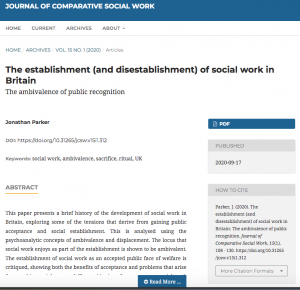
Jonathan Parker, Professor of Society and Social Welfare has a new paper published today in the Journal of Comparative Social Work.
The paper explores the ambivalent position social work enjoys as both a needed public service and a hated interference in private life. The utility of this ambivalence is manifest in the blame attached to social workers, rather than other professionals, when things go wrong. Social work fulfills a need in society that goes deeper than the surface-level aspects of helping and supporting. It offers a useful scapegoat to detract from wider political and governmental failings.
The paper is published under a creative commons license and can be accessed following this link https://journals.uis.no/index.php/JCSW/article/view/312.
New paper published by HSS PhD student Debora Almeida
https://intranetsp.bournemouth.ac.uk/documentsrep/8ACodeofPracticeforResearchDegrees.pdf
FHSS PhD student’s poster at prestigious GLOW conference
Today and tomorrow Sulochana Dhakal-Rai will have her poster ‘Factors contributing to rising Caesarean Section rates in South Asia: a systematic review’ online at this year’s GLOW Conference [Global Women’s Research Society Conference]. This year for the first time, this international conference is held completely online. Sulochana’s PhD project is supervised by Dr. Pramod Regmi, P., Dr. Juliet Wood and Prof Edwin van Teijlingen at BU with Prof. Ganesh Dangal [Professor of Obstetrics and Gynaecology at Kathmandu Model Hospital] who acts as local supervisor in Nepal. Sulochana has already published two papers from her on-going thesis research [1-2].
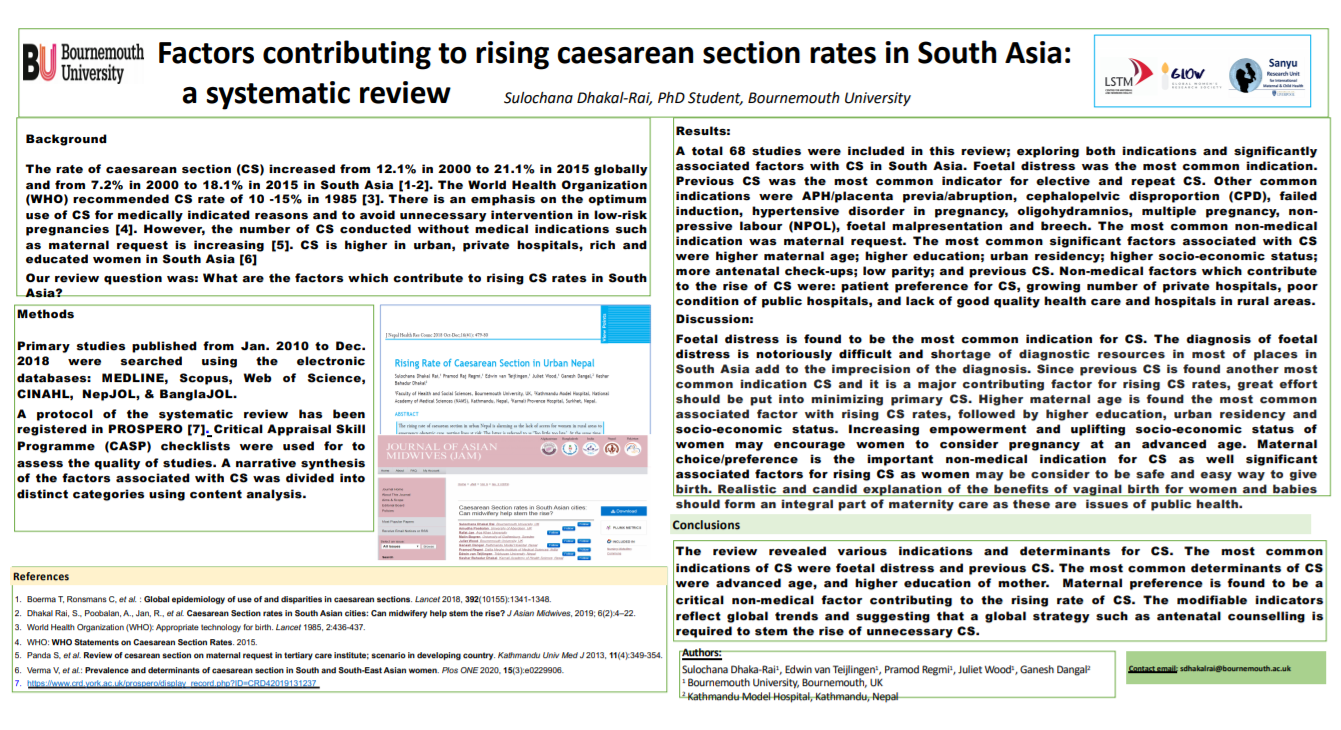
References
- Dhakal-Rai, S., Regmi, PR, van Teijlingen, E, Wood, J., Dangal G, Dhakal, KB. (2018) Rising Rate of Caesarean Section in Urban Nepal, Journal of Nepal Health Research Council 16(41): 479-80.
- Dhakal Rai, S., Poobalan, A., Jan, R., Bogren, M., Wood, J., Dangal, G., Regmi, P., van Teijlingen, E., Dhakal, K.B., Badar, S.J., Shahid, F. (2019) Caesarean Section rates in South Asian cities: Can midwifery help stem the rise? Journal of Asian Midwives, 6(2):4–22.
World Suicide Prevention Day: Responsible Suicide Reporting Model helps media report more ethically and responsibly
 By Dr. Ann Luce
By Dr. Ann Luce
Journalists have an important role to play in the prevention of suicide through ethical and responsible reporting of this sensitive topic. Global media reporting guidelines on suicide have been around for more than 20 years; UK-specific guidelines for at least half that. The Editor’s Code of Practice first updated its guidance on how to report suicide in 2006, with a further update in 2015.
Yet, suicide reporting in the UK continues to be problematic and harmful. Suicide rates in the UK are on the rise. Statistics released just last week, in advance of World Suicide Prevention Day, by the Office of National Statistics show there were 5,316 suicides in England in 2019, a rise of 5% in the suicide rate to 10.8 per 100K people, the highest rate since 2000. The UK suicide statistics are not yet available, but expected in the months ahead.
In 2018, across the UK, there were 6,507 deaths, which left up to 878,000 people bereaved and at a higher risk for suicide themselves. Never has responsible and ethical reporting of suicide been more important.
There is broad agreement within all global guidelines on suicide that key areas to consider include: method and location; copycat behaviour; appropriateness of language and word placement in a story; sensationalizing or romanticising suicide; celebrity cases; unusual situations like murder-suicide; use of video, audio and social media and the inclusion of helpline information.
However, the clauses in regulatory codes of conduct—as opposed to guidelines—mostly concentrate on reporting the method, and while they might aim to minimise harm, their scope in terms of suicide prevention advice is limited.
Journalists have frequently reported that they don’t use suicide guidelines because, a.) they are unaware of the guidelines, b.) they’re not legally required to follow them c.) they’re just too busy and forget to consult them. The problem here is that journalists do not always recognise the manner in which their reporting might be considered sensationalistic, stigmatising and unsafe.
My colleague, Dr. Sallyanne Duncan (University of Strathclyde) and I recently completed a study looking at adherence to media reporting guidelines in British journalism. We found that 55% of all stories in our sample were sensationalized. A quarter of stories provided explicit details about the method of death, while 23% provided explicit and unwitting ‘guidance’ or a roadmap on how to die by suicide using a particular method.
The word suicide appeared in 32% of all headlines, which is against the advice in media reporting guidelines. Just over 20% of stories made specific mention of the location of the death while 13% of stories framed and ‘normalised’ the act of suicide as if it were a solution to a problem, a rather simplistic assessment of a complex public health issue.
Unsurprisingly, we found that 61% of stories implied or emphasised a reason for suicide, reducing a complex problem down to a single unconfirmed reason. In 15% of online stories, video accompanied the story, which is considered harmful to those bereaved, as in most cases they have not provided permission. Most worrying of all was that 60% of stories did not contain helpline information, breaking World Health Organization, National Union of Journalists and Samaritan’s reporting guidelines on suicide.
To help journalists report more responsibly and ethically on suicide, we have devised the Responsible Suicide Reporting (RSR) model and an accompanying online toolkit, www.suicidereportingtoolkit.com.
The RSR model offers journalists a middle way to minimise harmful content whilst maximising supportive, helpful elements. The model supplements the valuable guidance produced by organisations like the WHO, Samaritans, National Union of Journalists, Independent Press Standards Organisation and Mindframe (Australia), and embeds this guidance in the storytelling process.
The RSR model is pragmatic and internal to journalists’ news-work. It functions within the storytelling process, reflecting recognised journalistic narratives involving people, although it may not be applicable to every extant story type, eg. stories based predominantly on data/statistics. But, it addresses hindrances to journalists’ use of guidelines, eg. lack of awareness, reluctance to consult them, taking time away from reporting to check and apply them, tight deadlines and fewer journalists doing increasing amounts of work.
The Responsible Suicide Reporting model consists of three steps:
- Identifying the suicide story type
- Applying 4 ethical rules
- Applying a standard of moderation
In Step 1, we ask journalists to identify which type of suicide story they are reporting:
- Event driven: the first recognition that a traumatic event has happened and that a newsworthy death has occurred
- Post judicial: focuses on a court case, inquest or other legal proceedings
- Tribute driven: where the grieving family and friends pay tribute to the deceased
- Anniversary: normally marking the death’s first anniversary, but can be later ones as well (suicide anniversaries tend to happen in 1, 5, 10, and 25-year blocks, such as in the case of the rock musician Kurt Cobain)
- Action as memorial: where the bereaved family and friends undertake a campaign, fundraising event or set up a charity in memory of their loved one
In Step 2, we ask journalists to apply the four ethical rules:
- Do not sensationalise: this happens when you put the word suicide in the headline or use ‘beautiful quotes’ such as ‘heaven has a new angel’ or ‘RIP Babes’
- Do not stigmatise: this happens when you describe someone as a ‘victim of bullying’, or describe them by their illness (autistic), nationality (Welsh) or religion (Muslim).
- Do not glorify: don’t focus on suicide as a life choice or focus on a particular method, ie. How Robin Williams took his own life
- Do not gratuitously report: don’t overly emphasize the reason for death, or focus on dying at a particular location, ie. Golden Gate Bridge, Beachy Head or a railway station
In Step 3, we ask journalists to apply a standard of moderation by asking themselves six critical questions:
- Have I minimised harm to those affected by suicide?
- Have I told the truth, yet avoided explicit details of method and location?
- Have I taken care in producing the story including tone and language?
- Have I used social media responsibly?
- Do I avoid stereotypes, harmful content and stigmatising stories?
- Have I provided support via helplines?
If journalists answer no to any of these questions, then it signifies that there is a problem with the story and they should go back and fix the problem so as not to cause harm to their audience.
Our RSR model is an attempt to provide an instrument that journalists can habitually implement as they report, without having to search for or recall external guidance whilst they are under pressure to produce content. By applying the RSR model, journalists can test whether their reporting is responsible, and thus in line with suicide reporting guidelines, relevant clauses in codes and journalism regulators.
We hope the application of this model and further research on our part, will be able to show a positive impact on suicide reporting around the world
Dr. Ann Luce is Associate Professor in Journalism and Communication, Bournemouth University and Dr. Sallyanne Duncan is Senior Lecturer in Journalism and Media Ethics, University of Strathclyde
COVID-19 publications at BU
Over the past half year or so BU academics have produced a healthy crop of publications on COVID-19/ corona virus. Searching the word ‘COVID’ today Saturday 5th September, on the university’s repository BURO (Bournemouth University Research Online), resulted in 59 records of publications whilst searching for ‘corona’ gave 48 publications. Removing duplicates, obviously irrelevant papers (e.g. one paper had a co-author called ‘Corona’) and papers published prior to 2020 resulted in a combined total of 66 BU publications. Some papers are obviously focused on COVID-19/corona virus, as the title suggests.  Others may merely mention corona virus or COVID-19 in the body of the text, perhaps as a reason for delay in the research, as a new opportunity or barrier and so on. A search on Scopus and BRIAN added nine more Bournemouth co-authored papers to the reference list below.
Others may merely mention corona virus or COVID-19 in the body of the text, perhaps as a reason for delay in the research, as a new opportunity or barrier and so on. A search on Scopus and BRIAN added nine more Bournemouth co-authored papers to the reference list below.
References from BURO & Scopus:
- Adedoyin, F., Bekun, F.V., Driha, M.O. and Balsalobre-Lorente, D., 2020. The Effects of Air Transportation, Energy, ICT and FDI on Economic Growth in The Industry 4.0 Era: Evidence from the United States. Technological Forecasting and Social Change. (In Press)
- Ahmed, O., Carmody, S., Walker, L. and Ahmad, I., 2020. The need for speed! 10 ways that WhatsApp and instant messaging can enhance communication (and clinical care) in sport & exercise medicine. British Journal of Sports Medicine. (In Press)
- Ahmed, O., Fulcher, M., Malone, D., Mira Y Lopez, C., Rho, M. and Strojna, A., 2020. The introduction of temporary concussion substitutions in disability football: Are we “headed” in the right direction? Football Medicine & Performance, Spring (32), 13 – 16.
- Akudjedu, T.N., Lawal, O., Sharma, M., Elliott, J., Stewart, S., Gilleece, T., McFadden, S. and Franklin, J.M., 2020. Impact of the COVID-19 pandemic on radiography practice: findings from a UK radiography workforce survey. British Journal of Radiology. (In Press)
- Alhassan, G., Adedoyin, F., Bekun, F.V. and Agabo, T., 2020. Does Life Expectancy, Death Rate and Public Health Expenditure matter in sustaining Economic growth under COVID-19: Empirical Evidence from Nigeria? Journal of Public Affairs. (In Press)
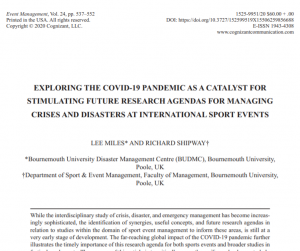
- Al Maamari, G., 2020. Multiple stakeholders’ perception of the long-term success of project: a critical study of Oman tourism resort projects. Doctoral Thesis (Doctoral). Bournemouth University
- Angelopoulos, C.M. and Katos, V., 2020. DHP Framework: Digital Health Passports Using Blockchain – Use case on international tourism during the COVID-19 pandemic. arXiv (2005.08922v2 [cs.CY]).
- Asim, M., Sathian, B., van Teijlingen, E., Mekkodathil, A., Subramanya, S.H. and Simkhada, P., 2020. COVID-19 Pandemic: Public Health Implications in Nepal. Nepal Journal of Epidemiology, 10 (1), 817 – 820.
- Azman, A., Singh, P., Parker, J. and Ashencaen Crabtree, S., 2020. Addressing competency requirements of social work students during the Covid-19 pandemic in Malaysia. Social Work Education. (In Press) DOI: 10.1080/02615479.2020.1815692
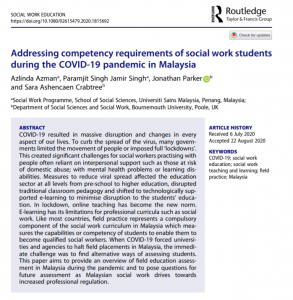
- Balsalobre- Lorente, D., Driha, O.M., Bekun, F.V., Sinha, A. and Adedoyin, F., 2020. Consequences of Covid-19 on the Social Isolation of the Chinese Economy: Accounting for the Role of Reduction in Carbon Emissions. Air Quality, Atmosphere and Health. (In Press)
- Cai, W., McKenna, B., Wassler, P. and Williams, N., 2020. Rethinking Knowledge Creation in Information Technology and Tourism. Journal of Travel Research. (In Press)
- Caudwell, J., 2020. Transgender and Non-binary Swimming in the UK: Indoor Public Pool Spaces and Un/Safety. Frontiers in Sociology, 5, 64
- Clarkson, B.G., Culvin, A., Pope, S. and Parry, K. D., 2020. Covid-19: Reflections on threat and uncertainty for the future of elite women’s football in England. Managing Sport and Leisure. (In Press)
- Côté, P, Bussières, A, Cassidy, J., Hartvigsen, J, Kawchuk, G., Leboeuf-Yde, C, Mior, S, Schneider, M, and more than 140 signatories# call for an end to pseudoscientif, and Breen, A. C., 2020. A united statement of the global chiropractic research community against the pseudoscientific claim that chiropractic care boosts immunity. Chiropractic & Manual Therapies, 28 (1), 21.
- Cretan, R. and Light, D., 2020. COVID-19 in Romania: transnational labour, geopolitics, and the Roma ‘outsiders’. Eurasian Geography & Economics. (In Press)
- Escaith, H., Khorana, S., MacGregor, J., Vickers, B. and Ali, S., 2020. The Potential Impact of COVID-19 on Commonwealth Trade, Recovery and Resilience. The Commonwealth Trade Hot Topics, 161.
- Esteves, L., Ashencaen Crabtree, S. and Hemingway, A., 2020. Impacts of C-19 lockdown on the work-life balance of BU academics – Preliminary results. Working Paper. Poole, England: Bournemouth University.
- Fowler-Watt, K., Majin, G., Sunderland, M., Phillips, M., Brine, D., Bissell, A. and Murphy, J., 2020. Reflections on the Shifting Shape of Journalism Education in the Covid-19 pandemic. Digital Culture and Education (June 22). (In Press)
- Gingrich, O., Shemza, A. and Almena, M., 2020. TRANSFORMATIONS: New media art between communities and professional practice. In: EVA London, 16-18 November 2020, London. (In Press)
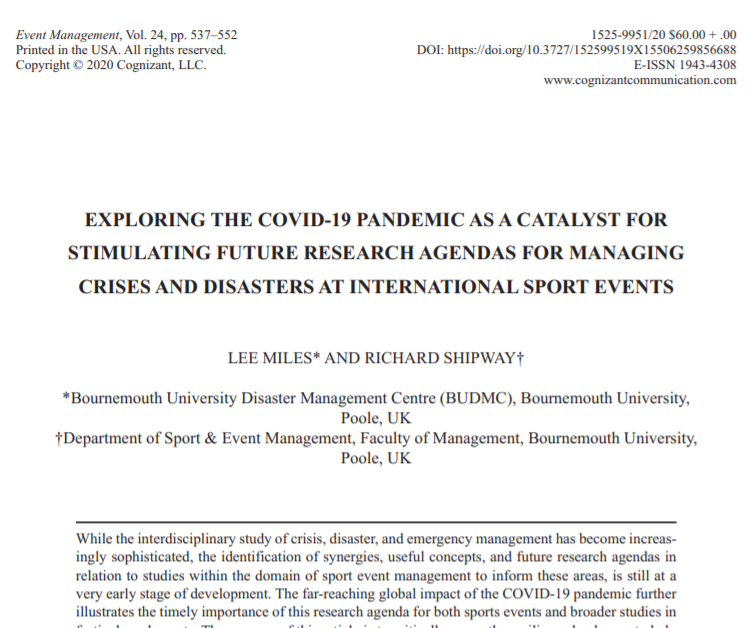 Giousmpasoglou C, Marinakou E, Zopiatis A. 2020. Ο ρόλος των Γενικών Διευθυντών στα ξενοδοχεία 4* και 5* κατά τη διάρκεια της πανδημίας COVID-19: μία έρευνα σε 45 χώρες. Money & Tourism Magazine
Giousmpasoglou C, Marinakou E, Zopiatis A. 2020. Ο ρόλος των Γενικών Διευθυντών στα ξενοδοχεία 4* και 5* κατά τη διάρκεια της πανδημίας COVID-19: μία έρευνα σε 45 χώρες. Money & Tourism Magazine- Hobson, S., Hind, M, Mojsilovic, A, Varshney, KR. 2020 Trust and Transparency in Contact Tracing Applications, CoRR, abs/2006.11356
- Hodge, S. and Johnson, L., 2020. The digitally resilient student. The Psychologist.
- Hughes, J.G., Leydon, G.M., Watts, S., Hughes, S., Brindle, L.A., Arden-Close, E., Bacon, R., Birch, B., Carballo, L., Plant, H., Moore, C.M., Stuart, B., Yao, G., Lewith, G. and Richardson, A., 2020. A feasibility study of a psycho-educational support intervention for men with prostate cancer on active surveillance. Cancer Reports, 3 (2), e1230.
- Jackson, D., Bradbury-Jones, C., Baptiste, D., Gelling, L. H., Morin, K., Neville, S. and Smith, G.D., 2020. Life in the pandemic: Some reflections on nursing in the context of COVID-19. Journal of Clinical Nursing, 29 (13-14), 2041-2043.
- Jackson, D., Bradbury-Jones, C., Baptiste, D., Gelling, L.H., Morin, K., Neville, S. and Smith, G.D., 2020. International Nurses Day 2020: Remembering nurses who have died in the COVID-19 pandemic. Journal of Clinical Nursing, 29 (13-14), 2050-52.
- Jan, R. and van Teijlingen, E., 2020. COVID-19: The New Corona Virus Upsetting Our World. Journal of Asian Midwives, 7 (1), 1 – 3.
- Kaolawanich, R., Oe, H., Yamaoka, Y. and Chang, C. Y., 2020. A discussion of a luxury apparel brand strategy in an emerging market: Conceptual model with network perspectives. Journal of Social, Cultural and Political Studies, 4 (2), 58 – 72.
- Khashu, M., Provenzi, L., Adama, E., Garfield, C., Koliouli, F., Fisher, D., Nørgaard, B., Thomson-Salo, F., van Teijlingen, E., Ireland, J. and Feeley, N., 2020. COVID-19 restrictions and fathers of infants in neonatal care. BMJ Global Health, 5 (4).
- Khorana, S, Escaith, H, MacGregor J, Vickers B, Ali S., 2020 The Potential Impact of COVID-19 on Commonwealth Trade, Recovery and Resilience he Commonwealth Trade Hot Topics Article number 161
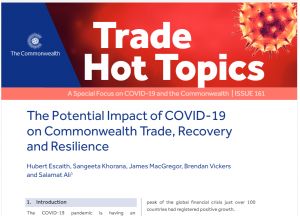
- Li, Z., Feng, C., Zheng, J., Wu, M. and Yu, H., 2020. Towards Adversarial Robustness via Feature Matching. IEEE Access, 8, 88594 – 88603.
- Light, D., Cretan, R., Voiculescu, S. and Juca, S., 2020. Introduction: Changing Tourism in the Cities of Post-communist Central and Eastern Europe. Journal of Balkans and Near Eastern Studies, 22 (4), 465-477.
- Lyne, M., Brown, K. and Grimshaw, K., 2020. Advance care planning. Poole, England: NCPQSW Bournemouth University.
- Lyne, M., Grimshaw, K. and Brown, K., 2020a. The Mental Capacity Act requirements for clinical decisions regarding treatment and care. Poole, England: NCPQSW Bournemouth University
- Lyne, M., Grimshaw, K. and Brown, K., 2020b. Guidance on the use of the Mental Capacity Act for decisions regarding clinical treatment and care: An introduction. Poole, England: NCPQSW Bournemouth University.
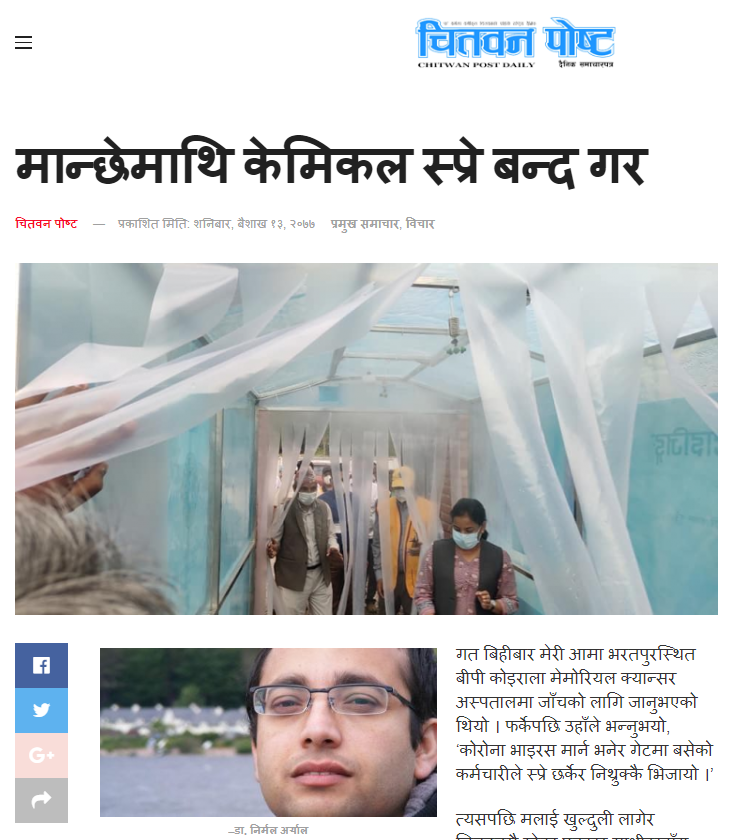
- Lyne, M., Grimshaw, K. and Brown, K., 2020c. The Mental Capacity Act requirements when an individual lacks the mental capacity to consent to treatment and care. Poole, England: NCPQSW Bournemouth University.
- Lyne, M. and Parker, J., 2020. From Ovid to Covid: The metamorphosis of Advanced Decisions to Refuse Treatment into a safeguarding issue. Journal of Adult Protection. (In Press)
- Mahato, P. K., Tamang, P., Shahi, P., Aryal, N., Regmi, P., Van Teijlingen, E. and Simkhada, P., 2020. Effects of COVID-19 during lockdown in Nepal. Europasian Journal of Medical Sciences, 2 (2).
- Matthews, J., 2020. “Cultural exceptionalism” in the global exchange of (mis)information around Japan’s responses to Covid-19. Media and Communication, 8 (2), 448-451.
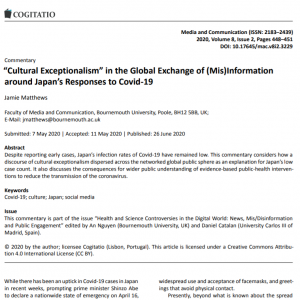
- McAlaney, J. and Hills, P.J., 2020. Understanding Phishing Email Processing and Perceived Trustworthiness Through Eye Tracking. Frontiers in Psychology, 11, 1756.
- Miles, L. and Shipway, R., 2020. Exploring the COVID-19 Pandemic as a Catalyst for Stimulating Future Research Agendas for Managing Crises and Disasters at International Sport Events. Event Management, 24 (4), 537- 552.
- Mimler, M., 2020. Current developments – Europe: The final nail in the coffin for the patent with unitary effect or just another bump in the road? The German Constitutional Court declares void the German Act of Approval on a Unified Patent Court (2 BvR 739/17). Intellectual Property Forum, 120 (June), 89 – 91.
- Muniz-Pardos, B., Shurlock, J., Debruyne, A., Steinacker, J.M., Börjesson, M., Wolfarth, B., Bilzon, J.L.J., Löllgen, H., Ionescu, A., Zupet, P., Dohi, M., Swart, J., Badtieva, V., Zelenkova, I., Casasco, M., Geistlinger, M., Bachl, N., Tsofliou, F., Di Luigi, L., Bigard, X., Papadopoulou, T., Webborn, N., Singleton, P., Miller, M., Pigozzi, F. and Pitsiladis, Y.P., 2020. Collateral Health Issues Derived from the Covid-19 Pandemic. Sports Medicine – Open, 6 (1), 35.
- Ndasi, W., Bolat, E. and Roushan, G., 2020. Digital cause-related marketing advertising formats: Do the perceived donation amount offer and gender matters in display advertising on non-profit digital sites? Journal of Advertising Research. (In Press)
- Nguyen, A. and Catalan, D., 2020. Digital Mis/Disinformation and Public Engagment with Health and Science Controversies: Fresh Perspectives from Covid-19. Media and Communication, 8 (2), 323 – 328.
- Nguyen, H. and Nguyen, A., 2020. Covid-19 Misinformation and the Social (Media) Amplification of Risk: A Vietnamese Perspective. Media and Communication, 8 (2), 444-447.
- O’Carroll, V., Owens, M., Sy, M., El-Awaisi, A., Xyrichis, A., Leigh, J., Nagraj, S., Huber, M., Hutchings, M. and McFadyen, A., 2020. Top tips for interprofessional education and collaborative practice research: a guide for students and early career researchers. Journal of Interprofessional Care. (In Press)
 Oe, H., 2020. Discussion of digital gaming’s impact on players’ well-being during the COVID-19. arXiv (2005.00594v1 [cs.CY]).
Oe, H., 2020. Discussion of digital gaming’s impact on players’ well-being during the COVID-19. arXiv (2005.00594v1 [cs.CY]).- Oe, H., Takemoto, T. and Ridwan, M., 2020. Is Gamification a Magic Tool?: Illusion, Remedy, and Future Opportunities in Enhancing Learning Outcomes during and beyond the COVID-19. Budapest International Research and Critics in Linguistics and Education (BirLE) Journal, 3 (3), 1401 – 1414.
- Oe, H. and Weeks, M., 2020. How to Support Vulnerable Citizens during the COVID-19 Lockdown: A Community Initiative from Ubiquitous Network Perspectives. Budapest International Research and Critics Institute (BIRCI-Journal), 3 (2), 1369 – 1377.
- Parrilli, M. D., Balavac, M. and Radicic, D., 2020. Business innovation modes and their impact on innovation outputs: Regional variations and the nature of innovation across EU regions. Research Policy, 49 (8), 104047.
- Patsakis, C., Casino, F. and Katos, V., 2020. Encrypted and Covert DNS Queries for Botnets: Challenges and Countermeasures. Computers and Security, 88 (January), 101614.
- Pinder, A.C., Raghavan, R., Britton, J. R. and Cooke, S.J., 2020. COVID-19 and biodiversity: The paradox of cleaner rivers and elevated extinction risk to iconic fish species. Aquatic Conservation: Marine & Freshwater Ecosystems, 30 (6), 1061-1062.
- Richards, B., 2020. The causes of sanity. Free Associations (78), 19-32.
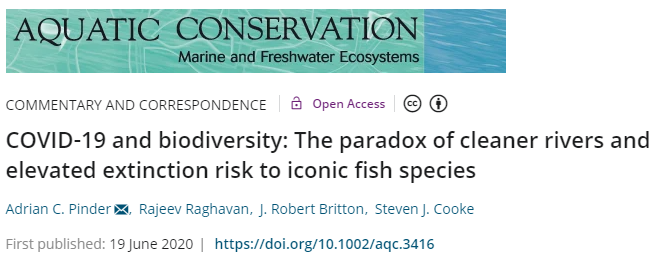
- Rosser, E. Westcott, L., Ali, P.A., Bosanquet, J., Castro-Sanchez, E., Dewing, J., McCormack, B., Merrell, J., Witham, G. 2020 The Need for Visible Nursing Leadership During COVID-19. Journal of Nursing Scholarship. (In Press)
- Rutherford, and Cownie, F., 2020. Teaching Advertising for the Public Good. Westminster Papers in Communication and Culture, 15 (2), 162-177.
- Short, M., Bitzer, J. and Rowlands, S., 2020. Testing times. The European Journal of Contraception and Reproductive Health Care. (In Press)
- Sathian, B., Asim, M., Mekkodathil, A., van Teijlingen, E., Subramanya, S.H., Simkhada, P., Marahatta, S.B. and Shrestha, U.M., 2020. Impact of COVID-19 on community health: A systematic review of a population of 82 million. Journal of Advances in Internal Medicine, 9 (1), 4 – 11.
- Simmonds A, Nunn A, Gray M, Hardie C, Mayo S, Peter E, Richards J. 2020. Pedagogical practices that influence professional identity formation in baccalaureate nursing education: A scoping review. Nurse Education Today 93:104516
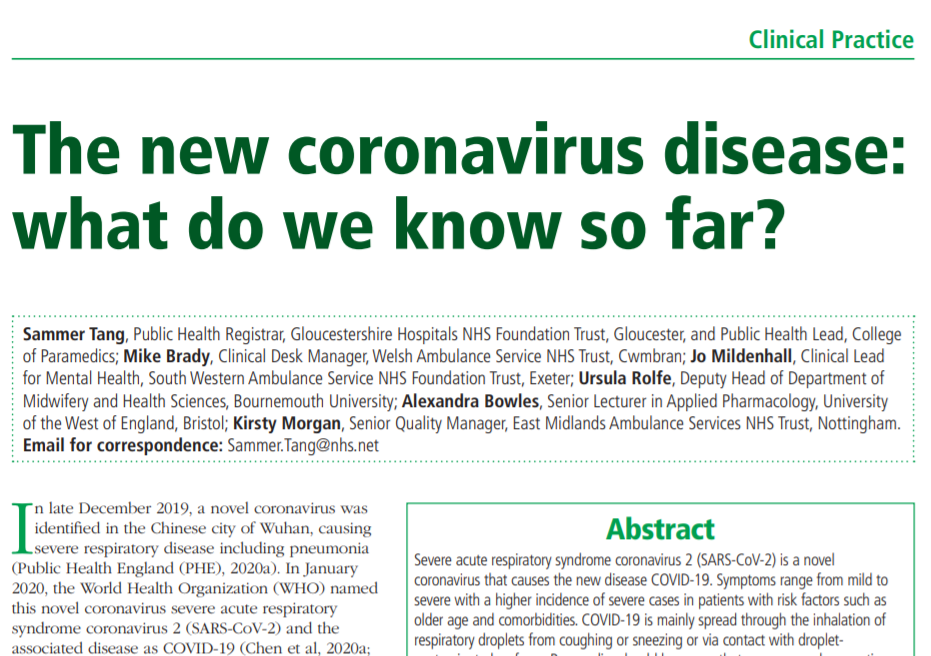
- Soopramanien, A., Jamwal, S. and Thomas, P., 2020. Digital health rehabilitation can improve access to care in spinal cord injury in the UK: A proposed solution. International Journal of Telerehabilitation, 12 (1), 3 – 16.
- Sreedharan, C., Thorsen, E., Upreti, L. and Sharma, S., 2020. Impact of COVID-19 on journalism in Nepal. Project Report. Tripureshwor, Kathmandu: Nepal Press Institute.
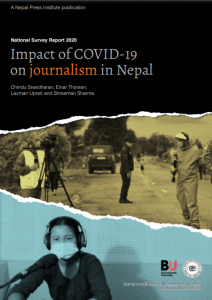
- Stankov, U., Filimonau, V. and Vujičić, M.D. 2020. A mindful shift: an opportunity for mindfulness-driven tourism in a post-pandemic world. Tourism Geographies. (In Press)
- Swain, I. D., 2020. Why the mask? The effectiveness of face masks in preventing the spread of respiratory infections such as COVID-19 – a home testing protocol. Journal of Medical Engineering & Technology, 1 – 4.
- Tamang, P., Mahato, P., van Teijlingen E, Simkhada, P. 2020 Pregnancy and COVID-19: Lessons so far, Healthy Newborn Network [14 April] healthynewbornnetwork.org/blog/pregnancy-and-covid-19-lessons-so-far/
- Tang,S., Brady,M., Mildenhall, J., Rolfe, U., Bowles,. A., Morgan,K,. 2020. The new coronavirus disease: what do we know so far? Journal of Paramedic Science, 12(5) https://doi.org/10.12968/jpar.2020.12.5.193
- Umesh U, Kundu, D, Selvaraj, C, Singh SK, Dubey, VK., 2020 Identification of new anti-nCoV drug chemical compounds from Indian spices exploiting SARS-CoV-2 main protease as target, Journal of Biomolecular Structure and Dynamics
- van Teijlingen, E., Asim, M. and Sathian, B., 2020. Coronavirus Disease (COVID-19) and the risk of Post-Traumatic Stress Disorder: A mental health concern in Nepal. Nepal Journal of Epidemiology, 10 (2), 841 – 844.
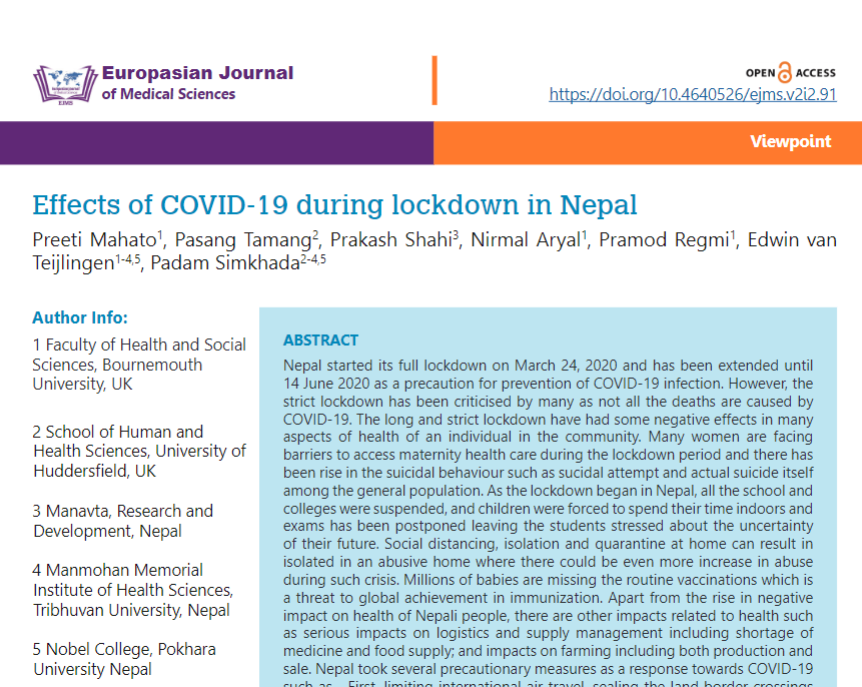 Wallis, R. and Van Raalte, C., 2020a. If industry-oriented degrees are the answer, what are some of the questions? How do students attribute value to their undergraduate experience from the perspective of post-university employment? WONKHE (19 May 2020).
Wallis, R. and Van Raalte, C., 2020a. If industry-oriented degrees are the answer, what are some of the questions? How do students attribute value to their undergraduate experience from the perspective of post-university employment? WONKHE (19 May 2020).- Wallis, R. and Van Raalte, C., 2020b. ‘Just the way the industry works’: how film and TV need to be more than fair weather industries. The Talent Manager (29 June 2020), 377.
- Wallis, R. and Van Raalte, C., 2020. Growing a sustainable workforce: A response to the DCMS Committee’s Call for Evidence for its inquiry into the ‘Impact of Covid-19 on DCMS sectors’. Discussion Paper. UK Parliament.
- Wainwright, T. and Low, M., 2020c. Beyond Acute Care: Why collaborative self-management should be an essential part of rehabilitation pathways for COVID-19 patients. Journal of Rehabilitation Medicine, 52, jrm00055.
- Wainwright, T., Gill, M., McDonald, D.A., Middleton, R.G., Reed, M., Sahota, O., Yates, P. and Ljungqvist, O., 2020. Consensus statement for perioperative care in total hip replacement and total knee replacement surgery: Enhanced Recovery After Surgery (ERAS®) Society recommendations. Acta Orthopaedica, 91 (1), 3- 19.
- Weidhase, N. and Wilde, P. 2020. ‘Art’s in pop culture in me’: Posthuman Performance and Authorship in Lady Gaga’s Artpop (2013). Queer Studies in Media and Popular Culture. (In Press)
- Wood, C. 2020. COVID-19: Protecting the medically vulnerable, British Journal of Nursing 29(12):660
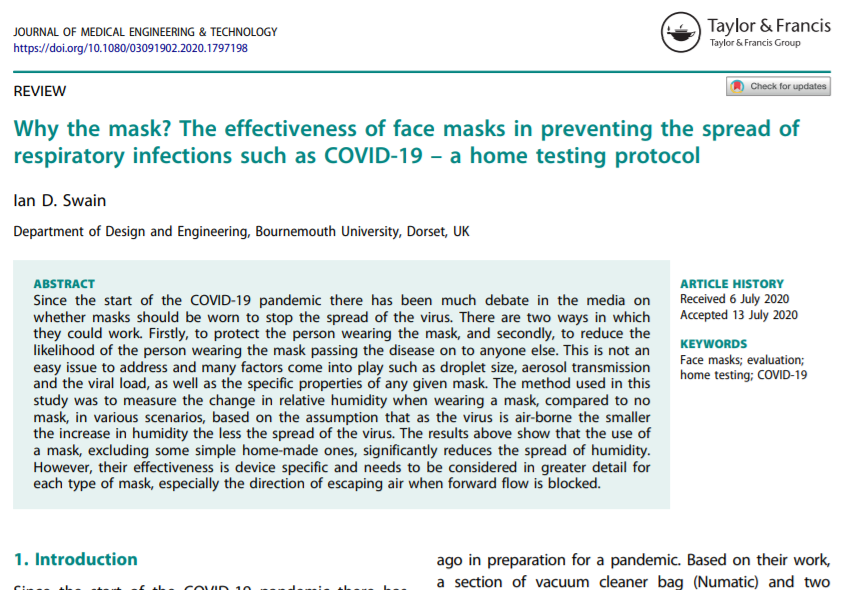 Zhao, X., 2020a. How China’s State Actors Create a “Us vs US” world during Covid-19 Pandemic on Social Media. Media & Communication, 8 (2), 452 – 457.
Zhao, X., 2020a. How China’s State Actors Create a “Us vs US” world during Covid-19 Pandemic on Social Media. Media & Communication, 8 (2), 452 – 457.- Zhao, X., 2020b. Auditing the “Me Inc.”: Teaching personal branding on LinkedIn through an experiential learning method. Communication Teacher. (In Press)
Whilst searching BU Research Blog added a further eight references:
- Aryal, N. (2020) Misinformation: a visible enemy of public health, BU Research Blog (27 May) https://blogs.bournemouth.ac.uk/research/2020/05/27/misinformation-a-visible-enemy-of-public-health/
- Alloh, F.T., Regmi, P., van Teijlingen, E. (2020) Is ethnicity linked to incidence or outcomes of Covid-19? (Rapid Response) BMJ (14 May) 369:m1548
- Ballardini, R., Santos Rutschman, A., Mendi, D. (2020) 3D Printing: How an Emerging Technology May Help Fight a Pandemic https://iprinfo.fi/artikkeli/3d-printing-how-an-emerging-technology-may-help-fight-a-pandemic/
- Heaslip, V., Parker, J. (2020) The hidden impact of coronavirus on Gypsy, Roma Travellers, The Conversation (18 August) https://theconversation.com/the-hidden-impact-of-coronavirus-on-gypsy-roma-travellers-141015
- Clarkson, B., Culvin, A., Parry, K., Pope, S. (2020) Coronavirus: the future of women’s football is under threat, The Conversation (15 June) https://theconversation.com/coronavirus-the-future-of-womens-football-is-under-threat-139582
- Batey, J., Parry, K. 2020. Coronavirus: why self-isolation brings mental health strain for elite athletes, The Conversation (14 April) https://theconversation.com/coronavirus-why-self-isolation-brings-mental-health-strain-for-elite-athletes-135273
- Hemingway, A. 2020. Nurses are on the coronavirus frontline, so why are they being left out of the response? The Conversation (9 Sept) https://theconversation.com/nurses-are-on-the-coronavirus-frontline-so-why-are-they-being-left-out-of-the-response-143658
- Miles, L. 2020. Sierra Leone faces coronavirus as rainy season hits – local disaster planning will be key, The Conversation (19 June) https://theconversation.com/sierra-leone-faces-coronavirus-as-rainy-season-hits-local-disaster-planning-will-be-key-139604

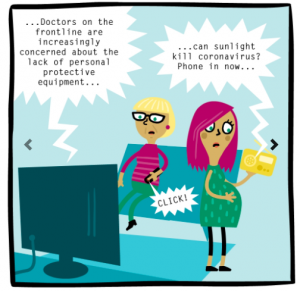 And last, but not least, BU’s PATH project team has produced a comic book to point pregnant women and their families to a collection of trusted online resources The interactive version of the book is here.
And last, but not least, BU’s PATH project team has produced a comic book to point pregnant women and their families to a collection of trusted online resources The interactive version of the book is here.
Prof. Edwin van Teijlingen
Centre for Midwifery, Maternal & Perinatal Health (CMMPH)
New paper by Assoc Prof Dr Jayne Caudwell

Congratulations to Associate Professor Dr Jayne Caudwell of the Department of Social Sciences and Social Work and Centre for Seldom Heard Voices who has published new research on transgender and non-binary swimming and sociologies of space and safety! The paper can be accessed following this link https://www.frontiersin.org/articles/10.3389/fsoc.2020.00064/full?utm_source=F-NTF&utm_medium=EMLX&utm_campaign=PRD_FEOPS_20170000_ARTICLE
New paper from Newton/Ungku Omar research collaboration with Universiti Sains Malaysia
Professors Sara Ashencaen Crabtree and Jonathan Parker of the Department of Social Sciences and Social Work and Centre for Seldom Heard Voices have published research that develops heir Newton/Ungku Omar research with Universiti Sains Malaysia for developing curricular and education for social workers in a time of pandemic.
COVID-19 resulted in massive disruption and changes in every
aspect of our lives. To curb the spread of the virus, many governments
limited the movement of people or imposed full ‘lockdowns’.
This created signific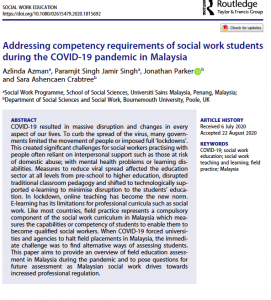 ant challenges for social workers practising with
ant challenges for social workers practising with
people often reliant on interpersonal support such as those at risk
of domestic abuse; with mental health problems or learning disabilities.
Measures to reduce viral spread affected the education
sector at all levels from pre-school to higher education, disrupted
traditional classroom pedagogy and shifted to technologically supported
e-learning to minimise disruption to the students’ education.
In lockdown, online teaching has become the new norm.
E-learning has its limitations for professional curricula such as social
work. Like most countries, field practice represents a compulsory
component of the social work curriculum in Malaysia which measures
the capabilities or competency of students to enable them to
become qualified social workers. When COVID-19 forced universities
and agencies to halt field placements in Malaysia, the immediate
challenge was to find alternative ways of assessing students. This paper aims to provide an overview of field education assessment in Malaysia during the pandemic and to pose questions for future assessment as Malaysian social work drives towards increased professional regulation.
Supporting integrated theses at BU
Over the last few months Library and Learning Support has been developing its guidance for integrated theses. This is a new format for BU which allows a candidate to incorporate material into their PhD already published or which they intend to publish elsewhere.
Orlanda Harvey was the guinea pig for our new guidlines when she submitted her thesis in July. Her title was “Male anabolic androgenic steroid-users: A mixed-methods study” and included articles which had been published as well as some intended for publication in the future.
I caught up with Orlanda recently to see how she had found the process, why she had taken the route of doing her thesis in this way and what advice she had for us in planning support for students doing integrated theses in the future.
You can watch our conversation and see our guidance for submitting an integrated thesis to the library in our Postgraduate Researcher Library Guide.
Productive week CMMPH
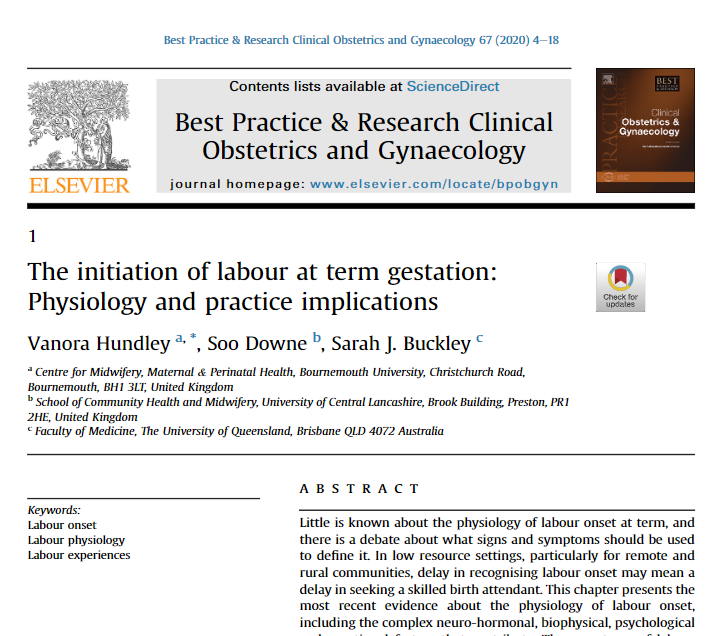 Some weeks are more productive than others and this week the academics in the Centre for Midwifery, Maternal & Perinatal Health (CMMPH) have been very busy. Professor Hundley published a paper ‘The initiation of labour at term gestation: physiology and practice implications’ with two midwifery colleagues [1]. The further two CMMPH paper accepted this week were systematic reviews: (a) Perceived Stress and Diet Quality in Women of Reproductive Age: A Systematic Review and Meta-Analysis; and (b) ‘Midwives’ views towards women using mHealth and eHealth to self-monitor their pregnancy: A systematic review of the literature’ [2-3]. Fourthly, CMMPH PhD student Sulochana Dhakal-Rai had a poster accepted at this year’s GLOW conference, which will be held, for the first time, online. This poster based on her PhD ‘Factors contributing to rising caesarean section rates in South Asia: a systematic review’ is supervised by Dr. Juliet Wood, Dr. Pramod Regmi, Prof. Edwin van Teijlingen and Prof. Ganesh Dangal (based in Nepal).
Some weeks are more productive than others and this week the academics in the Centre for Midwifery, Maternal & Perinatal Health (CMMPH) have been very busy. Professor Hundley published a paper ‘The initiation of labour at term gestation: physiology and practice implications’ with two midwifery colleagues [1]. The further two CMMPH paper accepted this week were systematic reviews: (a) Perceived Stress and Diet Quality in Women of Reproductive Age: A Systematic Review and Meta-Analysis; and (b) ‘Midwives’ views towards women using mHealth and eHealth to self-monitor their pregnancy: A systematic review of the literature’ [2-3]. Fourthly, CMMPH PhD student Sulochana Dhakal-Rai had a poster accepted at this year’s GLOW conference, which will be held, for the first time, online. This poster based on her PhD ‘Factors contributing to rising caesarean section rates in South Asia: a systematic review’ is supervised by Dr. Juliet Wood, Dr. Pramod Regmi, Prof. Edwin van Teijlingen and Prof. Ganesh Dangal (based in Nepal).
Congratulations!
Prof. Edwin van Teijlingen
References:
- Hundley V, Downe S, Buckley S (2020) The initiation of labour at term gestation: physiology and practice implications. Best Practice & Research Clinical Obstetrics & Gynecology 67: 4-18 https://www.sciencedirect.com/journal/best-practice-and-research-clinical-obstetrics-and-gynaecology/vol/67/suppl/C
-
Khaled K, Tsofliou F, Hundley V, Helmreich R, Almilaji O Perceived Stress and Diet Quality in Women of Reproductive Age: A Systematic Review and Meta-Analysis Nutrition (in press)
-
Vickery M, van Teijlingen E, Hundley V, Smith GB, Way S, Westward G. Midwives’ views towards women using mHealth and eHealth to self-monitor their pregnancy: A systematic review of the literature. European Journal of Midwifery (in press)
How Will Emerging Economies Reliant on Tourism Survive the Crisis?
How Will Emerging Economies Reliant on Tourism Survive the Crisis?
https://skift.com/2020/08/21/how-will-emerging-economies-reliant-on-tourism-survive-the-crisis/
21 August 2020
Dimitrios Buhalis, a professor of tourism at Bournemouth University, told Skift that countries which can temporarily divert their tourism workforce to other industries, such as to agriculture or fishing, may be able to weather the storm and see their tourism economies pick up where they left off, eventually. He pointed to the example of Bali, Indonesia, where the tourism workforce has largely shifted to more traditional economic means — certainly not without hardship.
But, Buhalis said, “where it’s more difficult is where tourism is 60, 70, 80 percent of the local economy and where you don’t have a local domestic market. Places where the country is small, geography does not support easy accessibility, and the social classes are very structured.” He noted that some Greek islands and countries such as the Maldives fall into this category.
Conversely, Buhalis said the emerging markets that will fare the best during Covid are those that have a large domestic population, an income distribution which means a sizeable percentage of locals can afford to travel, and the geography and infrastructure that allows them to do so.
Though he believes that tourism will recover — “we’ve seen how many people are desperate to travel” — he thinks the current moment represents something of a “fallow period” for tourism, one where governments who have already invested in tourism economies should continue to build up infrastructure and make industries more efficient for what he sees as tourism’s inevitable return.
“Apart from the health crisis we’re about to experience a major global recession beyond belief and that will damage tourism and will create a range of initiatives to prepare us for the next day,” Buhalis said. “We need to improve efficiency and we need to improve the way that we manage tourism.”
BU Social Entrepreneurs Forum offers FREE workshop on legal structures and funding for social businesses
More than a year ago ( in June 2019) BU Social Entrepreneurs Forum BUSEF was formed in partnership with Association of Sustainability Practitioners and Poole Bay Rotary Club.
Its overarching ambition is to support the development of the landscape of social businesses in the region.The forum’s objectives are underpinned by its commitment to the UN Sustainable Development Goals
In one year we have come a long way.We celebrated the first Bournemouth University Global Entrepreneurship Week in November and worked with local social entrepreneurs on student-led projects on business planning and model innovation and digital and social media marketing.
Sukanya says in the Dorset Biz News “We paused briefly, in solidarity with the rest of the world, during Covid-19 lockdown in the UK to reflect on how best to support our local community of existing and aspiring social entrepreneurs.
“Now, and celebrating our first year virtually, BUSEF is offering the first of many free workshops and interactive sessions.
“The first virtual session, on Wednesday August 19, from 2.30pm to 3.30pm, is on ‘Legal Structures and Sources of Finance’.
“We will be joined by Jonathan Dixon, Head of Grants Programme at YTKO and Mairead Taylor, Director, Commercial and Business Banking at NatWest.”
Register for FREE using this link and for more information please contact Sukanya at sayatakshi@bournemouth.ac.uk.
Launch of Suicide Reporting Toolkit
 We are thrilled to announce the launch of the Suicide Reporting Toolkit: For Journalists and Journalism Educators, available now at: http://www.suicidereportingtoolkit.com/
We are thrilled to announce the launch of the Suicide Reporting Toolkit: For Journalists and Journalism Educators, available now at: http://www.suicidereportingtoolkit.com/
We know from research that reporting suicide responsibly requires sensitivity and compassion. Our journalism has the potential to cause harm to vulnerable people if we do not report suicide responsibly and ethically. This new toolkit offers practical resources for both journalists and journalism educators to make sure we do just that.
Created by Dr Ann Luce (Bournemouth University) and Dr Sallyanne Duncan (University of Strathclyde), the Responsible Suicide Reporting model enables journalists–and journalism students–to make ethical decisions about their storytelling whilst under pressure from various news processes. It embeds global media reporting guidelines on suicide—World Health Organisation (WHO), Samaritans, Independent Press Standards Organisation (IPSO), National Union of Journalists (NUJ) and Society for Professional Journalists (SPJ)—within journalism practice and functions within the storytelling process so journalists can question their choices as they produce content.
We’d be very grateful if you could share this resource through your own networks. You can also follow us on Twitter: @SR_Toolkit
The Ethical Journalism Network has provided its international support to the project with an article here and podcast here.
For more information contact Ann Luce, Associate Professor in Journalism and Communication at: aluce@bournemouth.ac.uk
New publication
A new publication from former PhD student Billy Senington and his supervisor Jonathan Williams investigating low back pain in cricket fast bowlers. Open access in BMJ Open Sport and Exercise Medicine – please enjoy.
https://bmjopensem.bmj.com/content/6/1/e000818
Biomechanical risk factors of lower back pain in cricket fast bowlers using inertial measurement units: a prospective and retrospective investigation, 2020. BMJ Sport Ex Med 6 (1).
Interdisciplinary Public Health
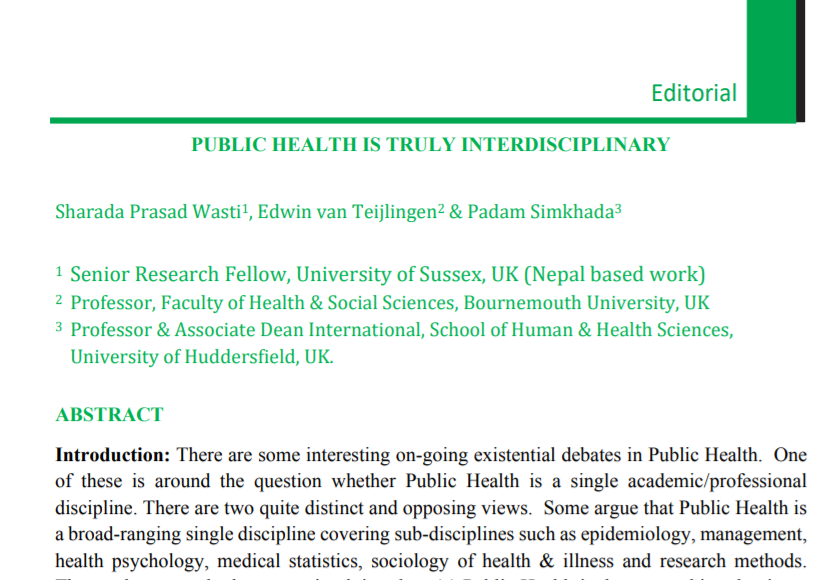
Yesterday the Journal of Manmohan Memorial Institute of Health Sciences published our editorial ‘Public Health is truly interdisciplinary’ [1]. This editorial was largely written to counteract some of the jurisdictional claims made in Nepal by certain people in Public Health. These claims express themselves in arguments around the question whether Public Health is a single academic discipline or profession or whether it is a broad profession comprising many different academic disciplines. There are two quite distinct and opposing views. Some argue that Public Health is a broad-ranging single discipline covering sub-disciplines such as Epidemiology, Management, Public Health Practice, Health Psychology, Medical Statistics, Sociology of Health & Illness and Public Health Medicine. Those who support this argument, typically see: (a) Public Health is the overarching dominant discipline, which brings these sub-disciplines together; and (b) that a true Public Health practitioner amalgamates all these individual elements. Others argue that Public Health is more an overarching world view or interdisciplinary approach for wide-ranging group of professionals and academics [2]. In this view some Public Health professionals are first trained as clinicians, others as psychologists, health economists, health management, statisticians, or demographers, and so on and have later specialised in Public Health.
However, their are people in the field claiming that Public Health is a single discipline that can only /or even best be practice and taught by those with an undergraduate degree in Public Health. Basically suggesting you you need a Public Health degree to practice or teach the discipline. Our editorial argues that this latter view suggests a rather limited understanding of the broad church that is Public Health.
This latest editorial is co-authored by Dr. Sharada P. Wasti in Nepal, Prof. Padam Simkhada, who is based at the University of Huddersfield and BU Visiting Faculty and Prof. Edwin van Teijlingen in the Centre for Midwifery, Maternal & Perinatal Health (CMMPH). Both articles listed below are Open Access and free available to readers across the globe.
References:
- Wasti, S.P., van Teijlingen, E., Simkhada, P. (2020) Public Health is truly interdisciplinary. Journal of Manmohan Memorial Institute of Health Sciences 6(1): 21-22.
- van Teijlingen, E., Regmi, P., Adhikary, P., Aryal, N., Simkhada, P. (2019). Interdisciplinary Research in Public Health: Not quite straightforward. Health Prospect, 18(1), 4-7.
Clinical Governance and Research Ethics @ BU has a new home
All guidance related to clinical governance and research ethics @ BU can now be found at Research Governance & Integrity (part of BU’s research environment website). By clicking on each “Explore….” section, you’ll find information on:
- Research Integrity
- Research Ethics
- Clinical Governance
- Data Protection and Research
Dr Choe joins the Mekong Tourism Advisory Board!
Dr Jaeyeon Choe in the Business School has accepted the invitation to join the Mekong Tourism Advisory Group. She will advise on projects around community-based small businesses in remote areas in the Mekong region, focusing on creative and innovative tourism products and programmes as recovery strategies during and after COVID-19.
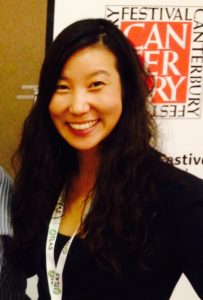
Please see the current initiatives from Mekong Tourism Coordinating Office below:
https://www.mekongtourism.org/
Dr Choe recently has been invited to a closed webinar, “Tourism Recovery through Travel Bubbles” as a panellist, by the Asian Development Bank, where UNWTO representatives were also participated. She discussed opportunities and challenges of domestic tourism and travel bubbles in Southeast Asia.
Whilst working actively with international organisations, she is looking forward to contributing to the communities on the Mekong, and communicate their needs to policy makers, and the academic community.
Parliament for Researchers – 45 minute online seminar series
Parliament’s Knowledge Exchange Unit is holding 45-minute online seminars on a variety of topics to help researchers confidently increase the impact and policy potential of their research.
The seminars will provide key information and tips in a short burst to ensure colleagues have the knowledge to begin engaging with Parliament.
How to engage with the UK Parliament
Join this webinar to explore how the UK Parliament uses research, and how you as a researcher can feed in your expertise.
- 14th October 2020, 2:00 – 2:45pm (links to registration page)
- 19th November 2020, 10:00 – 10:45am (links to registration page)
How to work with select committees
Join this webinar to explore how research is used by select committees, and how to feed in your expertise.
- 25th November 2020, 2:00 – 2:45pm (links to registration page)
How to write and target your research for a parliamentary audience
Join this webinar to explore how to write for a parliamentary audience and present briefings in a targeted, proactive way.
- 15th December 2020, 2:00 – 2:45pm (links to registration page)
Parliament for Early Career Researchers – how to engage with the UK Parliament
Join this webinar to explore how the UK Parliament uses research, and how to engage while juggling research, teaching and kickstarting your career.
- 28th October 2020, 2:00 – 2:45pm (links to registration page)
Parliament for PhD Students – how to engage with the UK Parliament
Join this webinar to explore how the UK Parliament uses research, and how to engage from the start of your research career.
- 9th December 2020, 2:00 – 2:45pm (links to registration page)
Parliament for Knowledge Mobilisers – how to support engagement with the UK Parliament
Join this webinar to explore ways to build and support your institution’s engagement with the UK Parliament.
- 3rd November 2020, 10:00 – 10:45am (links to registration page)
- 2nd December 2020, 2:00 – 2:45pm (links to registration page)
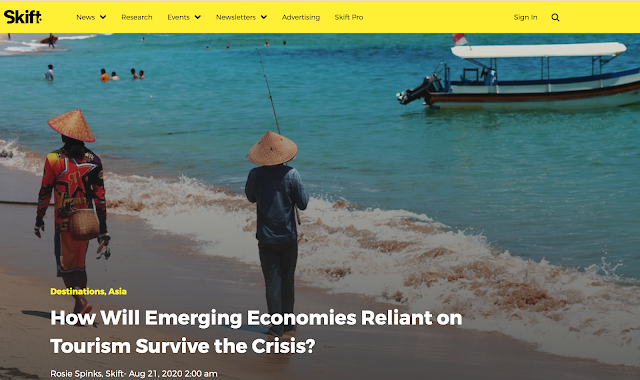











 FHSS academics teaching in Nepal
FHSS academics teaching in Nepal New weight change BU paper
New weight change BU paper One week to go! | The 16th Annual Postgraduate Research Conference
One week to go! | The 16th Annual Postgraduate Research Conference Geography and Environmental Studies academics – would you like to get more involved in preparing our next REF submission?
Geography and Environmental Studies academics – would you like to get more involved in preparing our next REF submission? Congratulations to three former BU staff
Congratulations to three former BU staff MSCA Staff Exchanges 2024 Call – internal deadline
MSCA Staff Exchanges 2024 Call – internal deadline Applications are now open for 2025 ESRC Postdoctoral Fellowships!
Applications are now open for 2025 ESRC Postdoctoral Fellowships! Horizon Europe – ERC CoG and MSCA SE webinars
Horizon Europe – ERC CoG and MSCA SE webinars MaGMap: Mass Grave Mapping
MaGMap: Mass Grave Mapping ERC grants – series of webinars
ERC grants – series of webinars